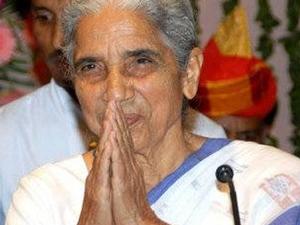 New Delhi, Aug 7: The government today justified sacking Mizoram governor Kamla Beniwal - just two months before her tenure ends - as it confronted opposition allegations of "vendetta politics".
New Delhi, Aug 7: The government today justified sacking Mizoram governor Kamla Beniwal - just two months before her tenure ends - as it confronted opposition allegations of "vendetta politics".
Ms Beniwal, who had sharp differences with Narendra Modi when he was Gujarat Chief Minister, had been shifted from Gujarat to Mizoram exactly a month ago.
"Action was taken within rules, as per Constitution. There are serious allegations. The government has taken serious note of her conduct," Parliamentary Affairs Minister Venkaiah Naidu, denying any politics behind the move.
Sources say Ms Beniwal's sacking is linked to her alleged involvement in a land scam four years ago, in her home state Rajasthan. She is accused of claiming plots of land after stating in false affidavits that she had tilled the land for 14 to 16 hours a day for 50 years, even when she was a minister in the state's Congress government.
Opposition parties, however, allege that the 87-year-old was punished for taking on Mr Modi in Gujarat, the state he ruled for 13 years before taking charge as Prime Minister in May.
Congress leader Manish Tewari said, "Governors are constitutional authorities. They cannot be trampled upon like this."
It is "clear political vendetta", added Congress ally Sharad Pawar of the Nationalist Congress Party, citing a 2010 Supreme Court ruling that a "change in government at the Centre is not a ground for removal of Governors to make way for others favoured by the new government."
Samajwadi Party's Naresh Aggarwal concurred, saying, "Political vendetta around the constitutional high office isn't good for the country."
As Gujarat governor, Ms Beniwal had challenged the Modi government on the appointment of a Lokayukta, or anti-corruption ombudsman. Recently, it was revealed that she spent Rs. 8.5 crore on frequent air travel at taxpayers' expense.
The ruling BJP moved to replace governors appointed by the previous Congress-led UPA regime days after coming to power. Six governors resigned and some refused to budge. Veteran Congressman Virendra Kataria was removed as the Lieutenant Governor of Puducherry recently.





Comments
Add new comment